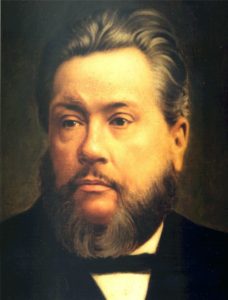The Lord be with you

Charles Haddon Spurgeon was a famous 19th century preacher who would not have cut it today. You see, he read his messages pretty much in a monotone. When asked about this, he said he didn’t want anything to distract from God’s word. Yet when you read his words, you can’t help but feel the emotion behind them. Below is an excerpt from one of his sermons. It deals with the mocking or doubt Christians might endure when their prayers seem unanswered and their trials stretch out over an extended period of time.
[Speaking of the trials a person may go through] … we may not come out [of them] tonight, nor tomorrow, nor next month, it may be not for years. We do not tie God down to conditions, and expect him to do this and that, and then if he does not in his wisdom see fit to do it, threaten that we will trust him no more. The very worst we could do would be to make the Eternal God a slave to time, as though he must do everything at our bidding, and measure his divine movements by the ticking of a clock. The Lord did deliver his Son Jesus Christ, but he suffered him to die first. He was put into the grave before he was uplifted from the power of death, and if it had not been that he died and lay in the tomb he could not have had that splendid deliverance which his Father did vouchsafe him when he raised him again from the dead. Had he not yielded to death there could have been no resurrection for him or for us. So, beloved, it may be God has not effected his purpose with you yet, nor has he quite prepared you for the height of blessing to which he has ordained you. Receive what he is going to give you, and take gratefully the painful preliminaries.
High palaces must have deep foundations, and it takes a long time to excavate a human soul so deep that God can build a gorgeous palace of grace therein. If it be a mere cottage that the Lord is to build in you, you may escape with small troubles, but if he is going to make you a palace to glorify himself withal, then you may expect to have long trials. Coarse pottery needs not the laborious processes which must be endured by superior vessels. Iron which is to become a sword for a hero must know more of the fire than the metal which lies upon the road as a rail. Your eminence in grace can only come by affliction. Will you not have trust in God if severe trials are ordained for you? Yes, of course you will. The Holy Spirit will be the all sufficient helper of your infirmities. I say it is misrepresentation if we limit the Holy One of Israel to any form for our deliverance or to any time for our deliverance. Let not the Lord of love be treated like a child at school, as if he could be taught anything by us!
So, also our faith must not judge at all by present circumstances. The ungodly world judges that God has not delivered us because we are now in trouble, and are at present distressed by it. O, how wrongly the world judged of Christ when it judged of him by his condition! Covered with bloody sweat and groaning out his soul to God beneath the olives at midnight—why, they that passed by who did not know him must have judged him to be a man accursed of God. “See,” they would have said, “we never heard of a man that sweat blood before—sweat blood in prayer, and yet listen to his groaning, he is not heard by God, for evidently the cup does not pass from him.” If any man had looked at our Lord Jesus when he was on the cross and had heard him cry, “My God, my God, why hast thou forsaken me?” they would have certainly concluded that he was the most ungracious and undeserving of men, for had he been a saint, surely, they say, God would not have forsaken him. Yes, but you see they only saw a little of our blessed Master’s career, they only looked upon a span of his existence; what a grievous error it was to have estimated his life by his brief passion, knowing nothing of its grand intent! See him now while harps unnumbered sound his praises and all heaven rejoices to behold his glory, and the Father looks upon him with ineffable delight. This is the same Jesus that was crucified. What think you of him now?
Charles Haddon Spurgeon (1834-1892)
A sermon, “Faith Among Mockers” delivered in the Metropolitan Tabernacle, February 1884
Source: For All the Saints, volume 2, year 1, 235-237
Italics in source
